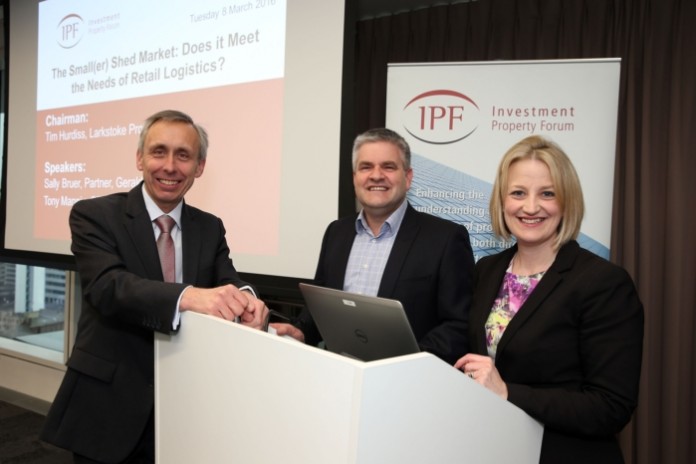More speculatively built warehousing and distribution units are urgently required to meet the insatiable demand for space from internet retailers and the logistics operators serving them.
According to Gerald Eve LLP, there are just five speculative units sized between 50,000 – 100,000 sq ft currently under construction in Birmingham and the West Midlands.
Sally Bruer, head of industrial research at the firm, said this is despite these units being snapped up within an average of two months from completion.
In a presentation to the Midlands branch of the Investment Property Forum (IPF) and the Industrial Agents Society (IAS) at Gowling WLG, Sally said: “More space is needed to satisfy the exceptional demand currently being recorded. Void periods for speculatively built smaller units of 50,000-100,000 sq ft have now shrunk to less than a month, compared with an average of 22 months during the recessionary years, which is a sure sign of pent-up demand.
“Internet retail sales are anticipated to grow by 18 per cent between 2015-2019. Our research shows that 6-7 million sq ft of space will be required each year to support this increase.
“The West Midlands, as the home of around six million people, will need more smaller logistics units to be able to ensure delivery of these goods can be achieved. As it is, you can count the number of smaller sheds being speculatively built in the region on one hand.”
The joint IPF and IAS event, attended by more than 80 members, explored whether the shed market is meeting the requirements of logistics operators.
Tony Mannix, chief executive officer of Clipper Logistics, which operates from 42 sites in the UK and Germany and manages e-fulfilment for John Lewis, ASOS, Asda and Tesco, told the audience that Clipper’s space requirements are constantly evolving.
He added: “Customers are more and more demanding. They are intolerant of delivery delays and want a seamless returns and refund process. If they don’t get that they will find an alternative supplier.
“As a result, companies such as Clipper are no longer responsible for just fulfilling orders, we need to fulfill expectations as well. To do this we need our properties to be flexible. The specification needs to allow for change and re-engineering over the lifetime of the building.
“If the property sector can provide innovative flexibility we are prepared to take on longer leases – up to ten years – which is an improvement on the norm of 3-5 years in recent times and should act as an incentive to developers.”
Tim Hurdiss of Larkstoke Properties chaired the event on behalf of the IPF.
He said: “The internet has fundamentally changed our shopping habits, which in turn has had a profound impact on the way goods are stored and moved around. The property industry needs to understand the issues and step up to the challenge faced by the retail and logistics sector.”





















